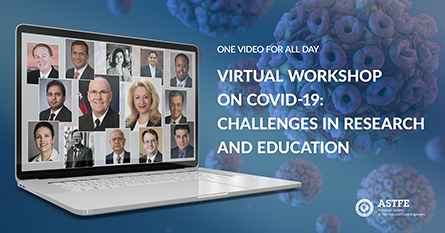Affiliation: M.D., Medical Director for the Respiratory Services, Mayo Clinic
Bio: Dr. Patel received his undergraduate training from Emory University, and subsequently graduate training from West Virginia University. He then completed his Residency in Internal Medicine and Fellowship in Pulmonary and Critical Care Medicine at the Mayo Clinic School of Graduate Medical Education. He currently is a consultant in the Departments of Pulmonary and Critical Care Medicine, and holds the Academic Rank of Assistant Professor of Medicine. Dr. Patel also serves as the Program Director of the Pulmonary and Critical Care Fellowship in Mayo Clinic Florida, Practice Chair for the Department of Pulmonary Medicine and is the Medical Director of Respiratory Services. His interests include Lung Cancer, Interventional Pulmonology and Invasive Mechanical Ventilation.
Affiliation: M.D., MICU Medical Director, Mayo Clinic
Bio: Dr. Sanghavi's educational experiences include board certification in internal medicine from Presence Saint Joseph Hospital in Chicago and Chief Residency in Internal Medicine at Presence Saint Joseph Hospital. He graduated from the Critical Care fellowship training program at Mayo Clinic, Rochester, followed by board certification in Critical Care Medicine. He did his graduate training at Washington University School of Medicine in Saint Louis, having completed a two-year Master's program in Health Administration. Currently he leads the Sepsis Committee and is the director of Medical ICU at Mayo Clinic Florida. He works in MICU, SICU and transplant ICU as staff intensivist.
Affiliation: Associate Professor and Director of The Fluid Dynamics of Disease Transmission Laboratory, MIT.
Bio: Dr. Lydia Bourouiba is an Associate Professor at the Massachusetts Institute of Technology, where she founded and directs The Fluid Dynamics of Disease Transmission Laboratory. Her research leverages advanced fluid dynamics experiments at various scales, biophysics, applied mathematics to elucidate interfacial flow and fluid fragmentation processes driving mixing, transport, and persistence of particles and microorganisms driving multiscale epidemiology and disease transmission in human, animal, and plant populations in particular. Prof. Bourouiba founded the Fluids and Health Conference, creating an international forum for exchange on frontier research and challenges in health, where fluid dynamic concepts are at the core, including infectious diseases and food safety, and related policy. Prof. Bourouiba is the recipient of many awards, including the Tse Cheuk Ng Tai’s Prize for Innovative Research in Health Sciences, the Ole Madsen Mentoring Award, and the Smith Family Foundation Odyssey Award for high-risk/high-reward basic science research.
Affiliation: CFD Innovators
Bio: Dr. Akshai K. Runchal obtained his Ph.D. in 1969 from Imperial College (London) under the guidance of Prof. D, B. Spalding. He was a key member of the 3-person team led by Spalding that invented the Finite Volume Method (FVM) of Fluid Dynamics (CFD) in mid 1960's. He started his professional career as a faculty member at IIT Kanpur in 1969. Since then he has taught as regular or adjunct faculty at a number of leading institutes including IIT(Kanpur), Imperial College (London), University of California (Los Angeles), Cal Tech (Pasadena), and Cal State (Northridge). In 1979, Dr. Runchal established the ACRi group of companies (www.acricfd.com) that now have offices in Los Angeles (USA), Nice (France) and Bangalore (India). Core expertise of ACRi Group is engineering, environmental and Space Sciences). Over the past 40 years they have provided advanced technology and CFD Simulation services to a over 200 clients that include major corporations, R&D organizations, cities and governments in over 20 countries. In 2011, Dr. Runchal founded a non-profit CFD Virtual Reality Institute (www.CFDVRi.org) to further the cause of CFD education, training and R&D.
For the past 50 years, Dr Runchal, has consulted extensively on projects related to flow, heat and mass transfer, combustion, environmental impact, management of air, surface and ground water resources, safe disposal of hazardous and nuclear waste, and, policy and decision analysis. He is the principal author of the ANSWER®, PORFLOW®, TIDAL®, and RADM™ simulation models that are widely employed by commercial, academic and R&D organizations. He obtained a Bachelor's in Engineering with Honors from Punjab Engineering College (PEC, Chandigarh) in 1964. He is the author or co-author of 10 books and over 200 technical publications. He is a Fellow of the ASME and has served as Chairman of the IIT Kanpur Foundation Board. He has been a regular member of the IIT Gandhinagar Advisory Board since 2012. He has acted as an Advisor to DeitY (Government of India) and the Indian Army. He has been engaged in assisting a number of educational institutes in their R&D and Industrial Relations Programs. Dr. Runchal has received professional honors and awards and, has provided invited contributions at a number of international conferences and seminars.
Dr. Runchal grew up in the scenic hill town of McLeod Ganj, Dharamsala that is now on the world map as the hometown of His Holiness the Dalai Lama. Since 2006 he has been deeply engaged in reviving the lost heritage of Kangra Miniature Paintings through Kangra Arts Promotion Society – an NGO based in McLeod Ganj. He divides his time between Los Angeles and McLeod Ganj and is actively engaged in promoting education, training and R&D in CFD and related disciplines.
Affiliation: Qualified Environmental Professional ( QEP); President, EnviroComp Consulting, Inc.
Bio: Dr. P. Zannetti dedicated his entire professional career over four decades to the study of air pollution and atmospheric sciences. He started his scientific career in the early 1970s at the IBM Research Center in Venice, Italy, at a time when IBM was sponsoring advanced computer simulation activities in environmental sciences and air pollution at several of its Research Centers throughout the world. Since then, Dr. Zannetti has focused his scientific research toward the development of advanced computer simulation techniques with practical applications to air quality problems in the international arena. In particular, he performed pioneering work for the development of new Lagrangian modeling techniques in which air pollution is simulated by computer methods using a series of independent segments, puffs, or particles.
Dr. P. Zannetti has worked for IBM Research (IBM Scientific Centers of Venice, Italy; Palo Alto, California; and Bergen, Norway), consulting companies (AeroVironment, Inc. and Failure Analysis/Exponent, Inc.), and government organizations (Kuwait Institute for Scientific Research, Kuwait, and CRTN-ENEL, Milan, Italy). He is the President of EnviroComp Consulting, Inc., a company he founded in 2001, and The EnviroComp Institute, a non-profit research organization he founded in 1996.
He has written more than 300 publications, including over 40 books and book chapters. Particularly important are: 1) the book "Air Pollution Modeling" completed in 1990, which was the first comprehensive book in the field and is still a widely used textbook today; and 2) the 4-volume book series "Air Quality Modeling", completed in 2010, which is the most updated and complete publication series on computer methods for air pollution studies.
He has studied many air pollution cases throughout the world. In particular, in his early scientific endeavors, he studied and modeled the air pollution problems affecting the city of Venice, Italy, and was the project manager of the first comprehensive air pollution study (monitoring and modeling) in the Persian Gulf.
In parallel with his research studies, in the last 25 years he has investigated, as a consulting expert, more than a hundred complex legal disputes and air pollution claims related to industrial, transportation, and agricultural activities, in the US and abroad, including shortterm and long-term emissions and accidental releases. Certain of these legal disputes involved class actions. In most of these cases, he simulated ambient concentrations and depositions caused by chemical emissions using his own computer models and/or those developed and recommended by government agencies, such as the EPA.
He has taught air pollution courses in Italy (University of Bari), California (Berkeley Extension), Kuwait (Kuwait Institute for Scientific Research), and England (Wessex Institute of Technology) where he is a Professor of Environmental Sciences. In the last 2 years, he has presented invited seminars at the United States Military Academy of West Point, and the universities of St. Petersburg (Russia), Amman (Jordan), and Roskilde (Denmark).
His professional credentials have been certified with the title of Qualified Environmental Professional (QEP), given by the Institute of Professional Environmental Practice (IPEP). The QEP certification recognizes professional achievements for environmental professionals and their compliance with the highest of ethical and professional standards. Since 1997, he has been the Regional Coordinator for IPEP in the San Francisco Bay Area.





















